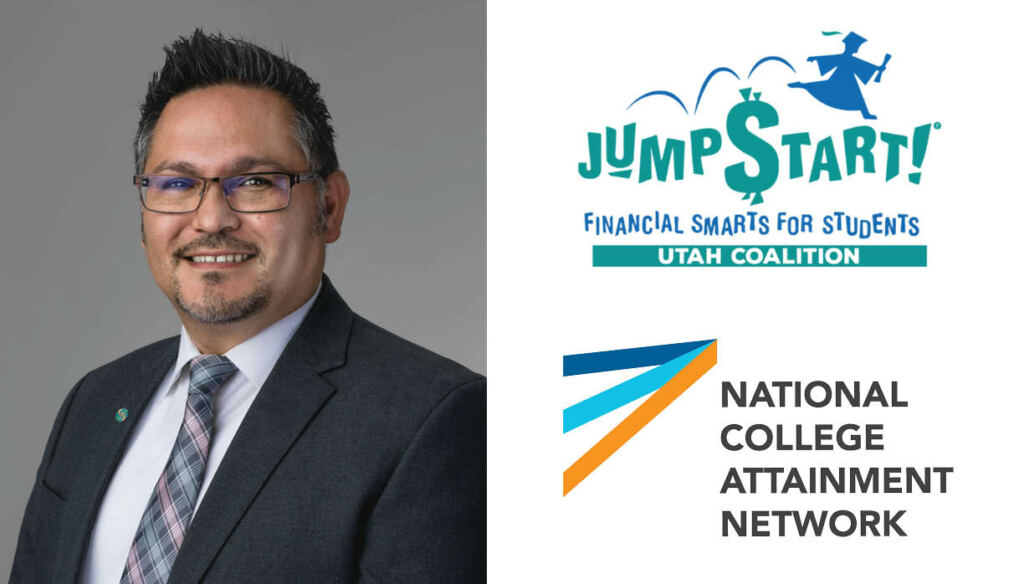Dr. Richard Gonzalez, Assistant Commissioner for Access for the Utah System of Higher Education, is kicking off the year with big accomplishments. He was named Board President of the Utah Jump$tart Coalition, a financial education organization for youth; he was also selected as a member of the national advisory committee for the National College Attainment Network, which supports underrepresented students to excel through higher education.
Later this year, Gonzalez will celebrate yet another accomplishment when his doctoral research, “How do Adult Learners Fit into Strategic Enrollment Management Plans? Attitude and Perception of Enrollment Managers,” is published.
With a doctorate from the University of Utah and an MBA from Utah State University, Richard Gonzalez has dedicated his career to making education accessible to everyone. That doesn’t stop with his role as Board President at the Utah Jump$tart Coalition. This organization trains K-12 teachers to promote lifelong successful financial decision-making. It also partners with organizations like my529, Utah’s educational savings plan, to give students resources to help them plan and pay their way through college. As Board President, Gonzalez leads and assists the coalition in executing these endeavors.
Gonzalez says in his new role, he’s had the rewarding opportunity to collaborate and lead initiatives and outreach programs to advance general financial literacy among Utah’s youth. He also teams up with leadership at the Utah State Board of Education to organize general financial literacy teacher trainings to boost the knowledge of the state’s youth—like the well-established annual $tart $mart Teacher Summit.
Utah Jump$tart has been at it for a long time—more than 20 years. Gonzalez says this shows its dedication to making financial smarts more accessible for schools, communities, and families in Utah. Additionally, his role with the Utah Jump$tart Coalition supports his work in the Utah System of Higher Education by helping Utah youth and families make wise decisions as they plan for higher education.
“The work of Jump$tart is critical,” Gonzalez said, because it targets K-12 students. By doing this, the coalition assists USHE in educating students on the many ways to prepare for college costs and ultimately helping students be better prepared as they transition to higher education and the workforce.
“Financial literacy is a fundamental key to ensuring that students who borrow for their post-secondary education do so wisely—this is a vital priority for our office—and it is the right thing to do,” Gonzalez added.
Gonzalez will continue his work to make education accessible as a member of the national advisory committee for the National College Attainment Network. He was one of 25 leaders from across the country selected for this role. NCAN is a nonprofit, nonpartisan association dedicated to helping first-generation, minority, and low-income students around the country succeed in college.
As a 2024 Advisory Task Committee member, Gonzalez will provide real-time knowledge of the conditions, obstacles, and victories of student NCAN members in Utah. He gives this year’s FAFSA rollout as an example, saying its delays, glitches, and overall complications have been a challenge affecting the entire nation. However, as an NCAN Task Force member, he collaborates with leaders directly involved with tackling FAFSA’s challenges. So, Gonzalez says he is confident Utah is addressing FAFSA’s problems effectively and efficiently, which directly aligns with the Utah Board of Higher Education’s access and affordability strategic plan initiatives.
Strategic Enrollment Management Quarterly (SEMQ) will publish Gonzalez’s doctoral research in the fall of 2024 as part of his continued work in education and advocacy for adult learners. SEMQ publishes articles on business practices, marketing, record-keeping, institutional research and analysis, and alumni relations and reaches more than 40 countries.
“National and local scholars note that adult learners—as undergraduate students and prospective students—are neglected, yet they are needed to meet higher education attainment goals and workforce needs,” said Gonzalez. “My research challenges the dependency on high school seniors and infuses a sense of urgency to equitable attention and support for adult learners. We need to go beyond piecemeal efforts and embrace all students.”


